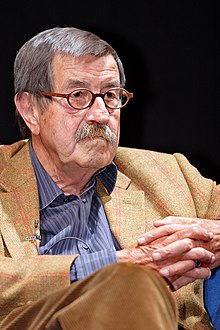Günter Grass
I Günter Wilhelm Grass (16 ya ing Octobre 1927 – 13 ya ing Abril 2015) métung yang Aleman a novelista, poeta, talasúlat drama, talagúlis, taladiséniong grafico, escultor, ampóng tínanggap king Galal a Nobel Para king Malagung Panyulat o Literatura anyang 1999.[1][2][3][4]
| Günter Grass | |
 I Grass kanitang 2006 | |
| Mibait | Günter Wilhelm Graß 16 ya ing Octobre 1927 Danzig-Langfuhr, Free City of Danzig |
|---|---|
| Mete | 13 ya ing Abril 2015 (edad 87) Lübeck, Alemania |
| Kapanintunan/propesion | Novelista, poeta, talasúlat drama, escultor, taladiséniong grafico |
| Asawa | Anna Margareta Schwarz (m. 1954; div. 1978); Ute Grunert (m. 1979) |
| Signature | |
 | |
Daléráyan
mag-edit- ↑ "Gunter Grass tries to hose down row over Israel", The Sydney Morning Herald (8 April 2012). Retrieved on 28 October 2023. Archived from the original on 10 April 2012. "Gunter Grass, Germany's most famous living writer, has tried to quell the growing controversy..."
- ↑ "Outrage in Germany", Der Spiegel (4 April 2012). "Günter Grass, Germany's most famous living author and the 1999 recipient of the Nobel Prize in literature..."
- ↑ "Yishai: Günter Grass not welcome in Israel", The Jerusalem Post (4 April 2012). "Germany's most famous living writer, the Nobel literature laureate Günter Grass..."
- ↑ "Outcry as Gunter Grass poem strongly criticises Israel", The Hindu (8 April 2012). "During his long literary career, Gunter Grass has been many things. Author, playwright, sculptor and, unquestionably, Germany's most famous living writer. There is the 1999 Nobel Prize and Mr. Grass's broader post-war role as the country's moral conscience..."